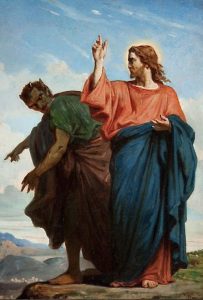HOMILY LENT SUNDAY 01 – Year A
Two Kinds of Sin Only
(Genesis 2:7-9, 16-18, 25, 3:1-7; Psalm 51; Rom 5:12-19; Mt 4:1-11)
**************************************************************
A woman back from shopping was showing her husband the expensive dress she had purchased. When he asked her why she bought a dress she did not really need, she replied that she couldn’t resist the temptation. Her husband countered with the comment that she should have been like Jesus who told Satan to get behind him. She replied that she did that, and Satan said that it looked even better from the back, so she bought it!
Let us today put our complete faith in Jesus who has no addiction in him, and live his way of humble, selfless love.
The first reading from the Old Testament touches on the primordial themes of original blessings, the temptation to decide for ourselves what is right and wrong, original sin, and the shame that is the result of that sin. This one reading encapsulates the situation the world finds itself in today, struggling with these same issues, raising up the need for a solution, for a ray of hope, indeed for salvation for a humanity that seems to have lost its way in the dizzying array of choices that face us every day.
Raymond Dlugos, former director of Southdown, a renewal centre for clergy and religious near Toronto, shares an interesting insight into the temptations that are highlighted in the gospel. He speaks of two kinds of sin only. One sin is to be more than human, to be super-human, above the pain of being human. The other sin is to be less than human, to let one’s self go into dissipation and dissolute living.
 The temptations Jesus faced to jump off the temple and to have all the power in the world was the temptation to be more than human. He was tempted to use his divine power in a selfish way, to avoid the pain of being human. And of course, Jesus resisted that temptation and chose to be simply fully human, to share the human experience.
The temptations Jesus faced to jump off the temple and to have all the power in the world was the temptation to be more than human. He was tempted to use his divine power in a selfish way, to avoid the pain of being human. And of course, Jesus resisted that temptation and chose to be simply fully human, to share the human experience.
The other temptation to turn stones into bread is the temptation to let himself go, to give in, to turn to alcohol, drugs, illicit pleasure, to avoid the pain of being human that way, to numb out and medicate that pain, to be less than human. And again, Jesus resisted that temptation and chose to be simply fully human, to share the human experience.
The Big Book of Alcoholics Anonymous describes these temptations as money, fame and power. Jesus did not fall to these temptations to be more than nor less than human; he chose to be fully human with us. What a contrast from an Italian leader who had to stave off charges of paying for sex with an underage prostitute, having consistently fallen to the temptations of possessions, pleasure, prestige and power. The unrest in the Middle East and Russia is revealing to the world the dreadful extent of the lust for precisely wealth, prestige and power – dictators, autocrats and oligarchs clinging to that power even at the cost of hundreds of human lives, using police and military might to try to stifle the will of the people protesting the abuse of that power.
The second reading contrasts Jesus from worldly leaders by portraying Jesus as the totally faithful one. Jesus redeemed and sanctified us by rejecting these temptations and remaining committed to his hour, his sacrificial death on the cross. It is his fidelity that overcame the sin of the world and made us righteous. We owe everything to Jesus, to his faithful love for the Father and his mission in the world.
Psychologists tell us that we have three options in the face of danger – fight, flight or freeze. If we are anger-based persons, we will fight back instinctively. If we are fear-based persons, we will run away or stuff and freeze our emotions. We can flee in all kinds of ways – alcohol, drugs, sex, gambling, even silent treatment. All these ways are temptations to avoid pain and conflict. Jesus shows us another way. He resists these temptations to resort to possessions, pleasure, prestige and power, and chooses the way of humble, faithful love that manifests itself best as forgiveness. He chooses to be fully human, and to show the world what true humanity looks like.
The Eucharist that we celebrate today is a humble meal. It calls us to be fully human, acknowledging our need for God’s Word and the Body and Blood of Jesus. We are empowered to resist the temptations that the Big Book of Alcoholics Anonymous calls “cunning, baffling and powerful,” temptations that lead to addiction, and to follow Jesus who has no addiction in him.
Let us today resist these temptations, put our complete faith in Jesus and live his way of humble, selfless love.



